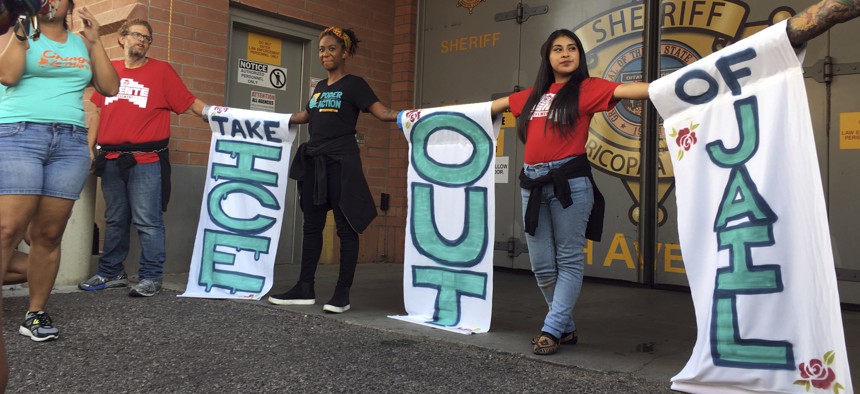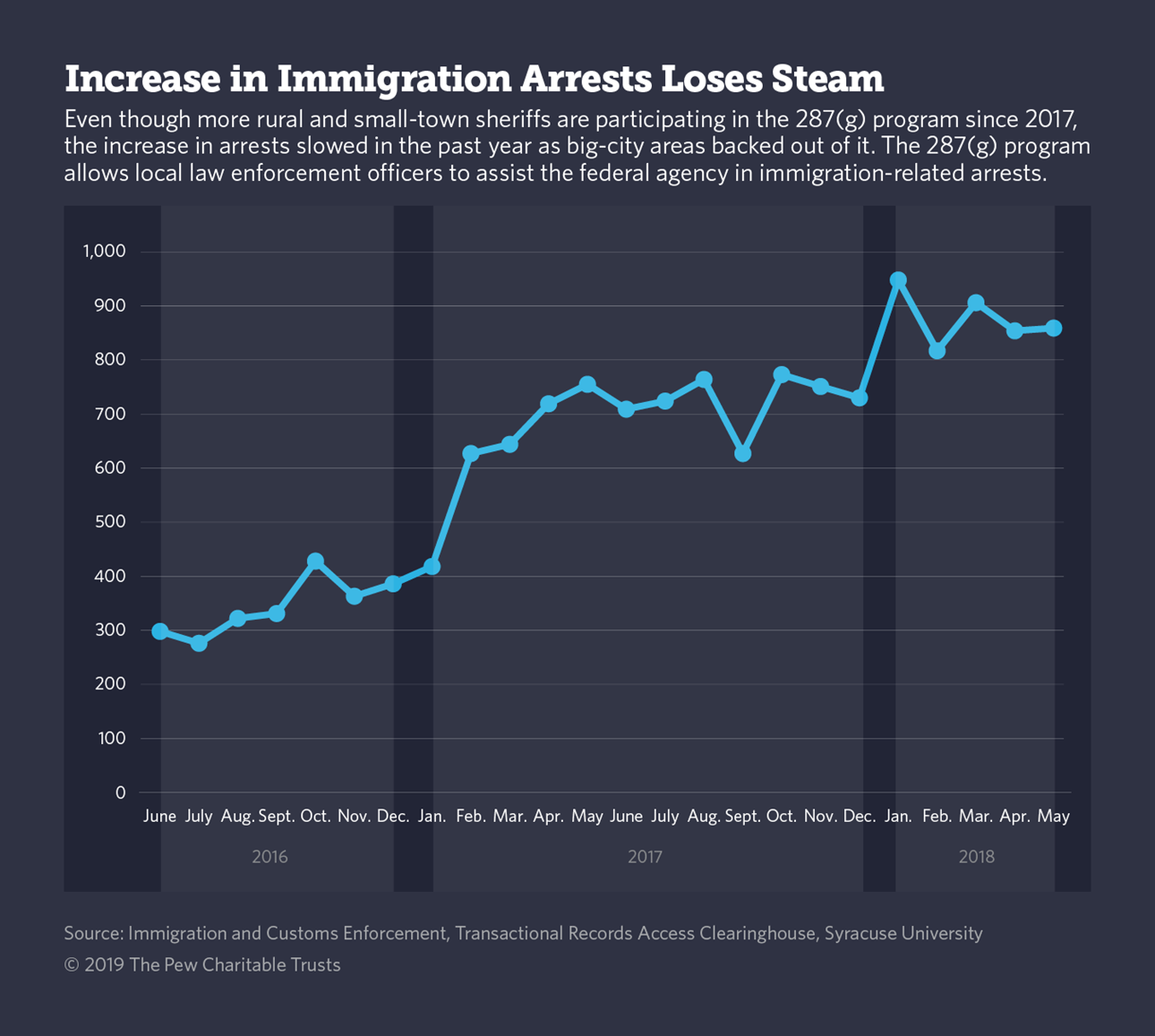Urban Sheriffs Flee ICE Program as Small Counties Join Trump’s Deportation Push

A group of protesters chain themselves to each other outside the Maricopa County Jail in downtown Phoenix during a protest against the sheriff's relationship with Immigration and Customs Enforcement, Aug. 22, 2018. AP Photo
Connecting state and local government leaders
An earlier increase in arrests related to the 287(g) program has slowed as more big-city sheriffs back out.
This story was originally published by Stateline, an initiative of The Pew Charitable Trusts.
Activists in North Carolina’s two largest cities, Charlotte and Raleigh, knocked on an estimated 12,000 doors last year to talk to voters about immigration and upcoming sheriff elections.
Thanks in part to that push, Democratic sheriff candidates in both counties won in November on a pledge to end participation in 287(g), a program that allows county sheriffs to help federal authorities deport immigrants living in the United States without authorization. The victors ousted incumbents who had pledged to keep the program in place.
Sheriff Garry McFadden celebrated by cutting a cake frosted with an anti-287(g) message when he was elected to lead the law enforcement agency in Mecklenburg County, which includes Charlotte. He said in a recent interview that he’s gotten “a thousand complaints and nasty messages a week” about his decision to stop the program, but he hasn’t changed his mind.
“We need to build trust with a community that does not trust us,” McFadden told Stateline. “Imagine a robbery victim afraid to call the police or witnesses afraid to come forward. That’s what we were dealing with.”
Among those complaining was Republican North Carolina state Rep. George Cleveland of Jacksonville, some 200 miles east of Charlotte, who told Stateline that “with the cost of illegal immigrants to the state, not to mention the crimes committed by illegals, I would think a law enforcement officer would want to do all he could to rid the state of the problem, including participation in 287(g).”
Urban counties across the country increasingly are withdrawing from the program, even as more conservative suburban and rural areas flock to it during the Trump administration, according to a Stateline analysis of federal and state data. Overall, the number of federal agreements with local law enforcement agencies has more than doubled, to about 75, with 45 of them signed since President Donald Trump took office two years ago. But the increase in arrests related to the program has slowed as more big-city sheriffs back out.
The sheriffs who joined the program were overwhelmingly small-town or suburban and Republican, Stateline found, though not all counties have partisan races for sheriff. The only urban counties to join were those encompassing Fort Worth, Texas, and Knoxville, Tennessee. None of the new sheriffs to join the program ran as a Democrat in the general election. There were no new 287(g) agreements with city police agencies, which generally aren’t elected positions and usually are not in charge of jails as are county sheriffs.
The expansion came so fast that it caused administrative problems; U.S. Immigrations and Customs Enforcement (ICE) didn’t hire enough new managers to oversee the new programs and train sheriff’s deputies, according to an Inspector General report in September.
The 2018 elections hastened the change not only in Mecklenburg and Wake counties in North Carolina, but also in Maryland’s Anne Arundel County, home to the state capital of Annapolis, where a 287(g) program ended. A new sheriff in North Carolina’s Henderson County, near Asheville, said he was reviewing the 287(g) program after protests during the election, but has not announced a decision.
Another area in North Carolina, Alamance County west of Chapel Hill, announced it would not start 287(g) again after the election, though it was not a campaign issue.
Under the 287(g) program, sheriff’s deputies check inmates’ immigration status during the booking process in county jails using computer equipment and databases provided by ICE. Deputies flag some inmates for possible federal arrests and deportation.
Arrests under the 287(g) program spiked from fewer than 300 a month in mid-2016—the last few months of the Obama presidency—to 945 in January 2018, but have not reached that level again as of July 2018, which is the latest data available, as some of its largest law enforcement agencies leave the program. Arrests varied from 816 in February to 903 in March. The arrest numbers by county were compiled by the Transactional Records Access Clearinghouse (TRAC) at Syracuse University, using records obtained from ICE and other agencies.

Even the addition of dozens of new smaller county sheriff agencies has not made up for the departure of some of the largest liberal counties. Los Angeles County stopped participating in 2015, and the trend has spread, with Hudson County, New Jersey, and urban parts of red states such as Texas and North Carolina likewise quitting after Trump took office in 2017.
“There seems to be an increasing split, where smaller counties are on board and bigger counties are not,” said Lena Graber, a staff attorney who follows 287(g) issues at the Immigrant Legal Resource Center, an immigration advocacy group in San Francisco.
“There are a lot of new places signing contracts [for 287(g)], but the major cities have rejected it,” said Chris Rickerd, an attorney for the American Civil Liberties Union, which opposes the program. In California, two large counties — Orange County near Los Angeles and San Diego County—were forced to drop 287(g) by a state law that took effect in 2018.
The two North Carolina counties that dropped out this month are the state’s most populous and had among the highest numbers of arrests nationally in the first seven months of fiscal 2018: 370 for Wake and 309 for Mecklenburg.
The only counties with more arrests during that period were Gwinnett County, Georgia, with 1,434; Clark County, Nevada, with 676; Collier County, Florida, with 471; Cobb County, Georgia, with 404; and Prince William County, Virginia, with 346. Clark County, which includes Las Vegas, reelected Republican Sheriff Joe Lombardo in June.
In North Carolina, activists in both counties worked to generate voter interest in November’s sheriff election by talking about 287(g), said Robert Dawkins, organizer for the Safe Coalition in North Carolina, a criminal justice advocacy group that supervised the effort.
“We didn’t think this is what Charlotte and Raleigh wanted to be as a city,” Dawkins said. “People who were not doing anything of consequence were getting deported. We want everybody here to feel safe when they call the police or the sheriff.”
In Maryland, the urban-suburban split likewise played out in November. Anne Arundel County dropped out of the program after Democratic County Executive Steuart Pittman was elected in November on a promise to end 287(g). In most counties, the sheriff negotiates for a 287(g) agreement, but in Anne Arundel it’s the county executive.
But in suburban Harford County north of Baltimore, and in more rural Frederick County at the Pennsylvania border, sheriffs participating in 287(g) won reelection. Republican Sheriff Charles Jenkins of Frederick County was reelected to a fourth term in a close race over a Democratic opponent who pledged to end the agreement.
“It was the closest race I’ve ever had. I’m not sure how much 287(g) had to do with it. I suspect it was part of it, but mostly I think [the closeness of the race] was high Democrat turnout,” Jenkins said. “I have to tell you, I get yelled at a lot about 287(g) at election time, but I can’t tell you how many people come up to me on the street and give me a thumbs-up and say, ‘Keep doing what you’re doing.’”
rump encouraged more sheriffs to join in a January 2017 executive order, among the first of his presidency, promising to “empower state and local law enforcement agencies across the country to perform the functions of an immigration officer.”
Harris County, Texas, which includes Houston, used to have by far the most 287(g) arrests in the country—more than 1,000 a year—before Democratic Sheriff Ed Gonzalez ended the program shortly after taking office in early 2017.
But months after Harris County dropped out, ICE celebrated the recruitment of 18 smaller counties in Texas, including three in the Houston suburbs as well as Fort Worth’s Tarrant County, all run by Republican sheriffs.
Another large county in the Houston suburbs, Fort Bend, decided against joining the program in 2017, citing the $500,000 cost of training officers.
ICE officials were not available for comment because of the federal government shutdown.
As of mid-2018, the latest figures available, the most 287(g) arrests now come from Gwinnett County, Georgia, in suburban Atlanta. The county has a longstanding 287(g) program under which arrests jumped from less than 50 arrests a month in 2016 to around 200 in most months under Trump.
“There is a higher volume of people coming into our jail now. We have not made any changes. We simply follow the law,” said Gwinnett County sheriff’s deputy Shannon Volkodav, a spokeswoman for Sheriff R.L. “Butch” Conway, a Republican. “Our only interest in immigration is to identify criminals who put our community’s safety at risk.”

NEXT STORY: Florida’s New Governor Wants to Oust Another Local Official


